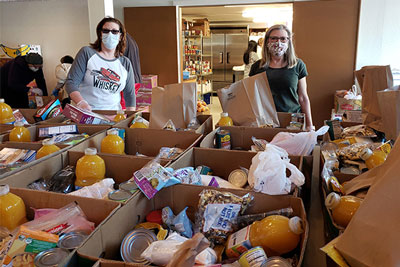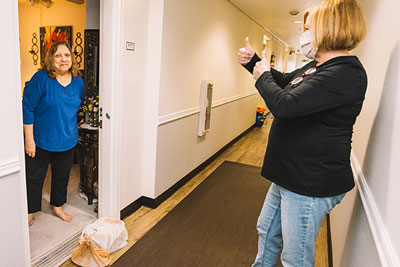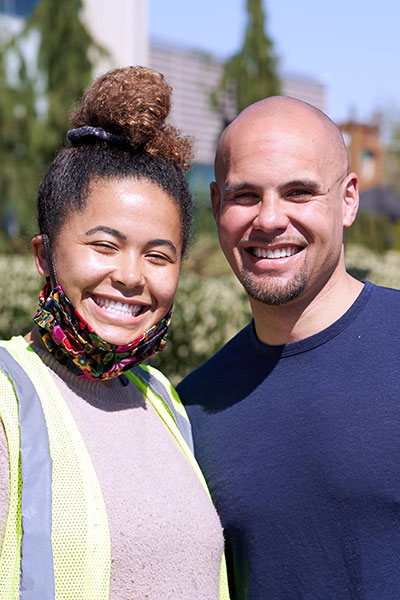Food is a daily need, so it’s not surprising that local food banks and pantries are on the forefront of COVID-19 relief efforts.
While fielding the first wave of need, they are also dealing with the same tectonic shifts that many of us have experienced with food. These organizations are navigating challenges such as food shortages, supply chain issues, changing health measures and growing demand. It’s a perfect storm. Thankfully, nonprofits are well-versed in adapting quickly and working together to offer aid where it’s needed most.
The SW Washington COVID Response Fund operates on this same principle — to provide rapid-response grants to nonprofit partners that are serving those hit hardest by COVID-19. To date, this emergency fund has granted more than $400,000 in relief to 16 nonprofits that are responding to increasing needs for food within neighborhoods and communities across our region.
Below, we have compiled insights provided by seven of our trusted partners. Each shows how this pandemic is transforming the ways they provide people with food and hope.
COVID-19 Relief Efforts: Seven Nonprofits Providing Emergency Food Assistance
1. Clark County Food Bank
Clark County’s regional food bank usually collaborates with 43 partners at 130 distribution sites to provide over 8 million pounds of food and 6.7 million meals a year. Due to COVID-19, it’s now focusing its distribution to 20 food sites that serve the whole community, though food is available to any partner who needs it. With state and federal food provisions experienced long delays, this has been harder. So, in order to bridge the gap, the food bank received a grant to purchase a large quantity of food. Thanks to an outpouring of volunteer support, a new “drive-thru” service launched and now provides emergency food boxes to more than 1,500 people per week.
2. One Life Food Pantry
 Located in the Uptown business district, this food pantry is the nearest sustenance for some of Vancouver’s most underserved neighborhoods. However, One Life serves all zip codes in Clark County. A grant from the COVID Response Fund is helping to provide residents with food as often as they need during COVID-19. Due to health precautions, the pantry has temporarily replaced its “shopping-style” experience with pre-made food boxes. The pantry provides boxes during a one-hour window every Saturday morning. The volunteers packing those boxes are younger than usual and — along with staff — are now using face masks and gloves, disinfecting often and ensuring proper social distancing.
Located in the Uptown business district, this food pantry is the nearest sustenance for some of Vancouver’s most underserved neighborhoods. However, One Life serves all zip codes in Clark County. A grant from the COVID Response Fund is helping to provide residents with food as often as they need during COVID-19. Due to health precautions, the pantry has temporarily replaced its “shopping-style” experience with pre-made food boxes. The pantry provides boxes during a one-hour window every Saturday morning. The volunteers packing those boxes are younger than usual and — along with staff — are now using face masks and gloves, disinfecting often and ensuring proper social distancing.
3. Washington Gorge Action Programs
This community-based organization operates the Stevenson Food Bank is operated, and safety has also become its top concern. Those they serve are often older and have existing health issues, so caring friends and family members are now picking up food. That means staff now fills out applications on their behalf. In addition, the organization offered to take on the Three Squares backpack program when local schools closed. Doing all of this in a time when its unable to accept new volunteers is an amazing feat. It’s thanks to staff, who are putting in more time to provide food and preparing for a months-long recovery process.
4. FISH of Cowlitz County
Partnering with churches to distribute food, this all-volunteer organization provides Cowlitz County residents with up to 12 days of meals per month. March requests rose by 26 percent, because school and business closures or job losses impacted so many families. This created capacity concerns, because most FISH volunteers are older and may have to reduce their commitment for health reasons. Working with Youth and Family Link, they devised a plan to deliver food boxes and outreach support to the populations served by both organizations, which includes those on fixed incomes, elders, and low-income Hispanic and Chuukese families.
5. Meals on Wheels People
 This mainstay for elders closed its dining centers in mid-March, and rolled out a modified delivery program to fulfill an additional 600 requests a week — twice its monthly average before COVID-19. Instead of daily deliveries, volunteers now place a week’s worth of food on door handles, give a knock and step back. This system reduces exposure for homebound elders and volunteers. The Vancouver Housing Authority partnered with the Portland-based nonprofit to provide this service for homebound elders at fifteen of its properties. As a result, the organization asked for support to increase its Clark County services two-fold.
This mainstay for elders closed its dining centers in mid-March, and rolled out a modified delivery program to fulfill an additional 600 requests a week — twice its monthly average before COVID-19. Instead of daily deliveries, volunteers now place a week’s worth of food on door handles, give a knock and step back. This system reduces exposure for homebound elders and volunteers. The Vancouver Housing Authority partnered with the Portland-based nonprofit to provide this service for homebound elders at fifteen of its properties. As a result, the organization asked for support to increase its Clark County services two-fold.
6. Clark County Veterans Assistance Center
Upwards of 40 volunteers helped serve two hot meals to veterans every day and staffed a lounge where vets could recharge and access resources. With the arrival of COVID-19, many of these comforts and volunteers have disappeared. Bagged meals are now handed out, and clients are only allowed inside under emergency situations. The one constant has been the organization’s food box program for homeless and financially insecure vets. As anticipated, staff received an influx of requests for food. With a COVID Response Fund grant, it was able keep up by restocking its pantry with staples and offering delivery options for those lacking transportation or mobility.
7. Unite! Washougal Community Coalition
Another unique partnership in Washougal is giving parents the opportunity to enjoy nutritious meals with their children. Unite! Washougal encourages healthy choices by supporting youth, encouraging families and enriching community. So, when the Washougal School District needed fundraising support for its Adult Nutrition program, Unite! saw it as a perfect extension of its mission. Together, these organizations gathered donations from over seventy individuals and businesses, which will provide more than 14,000 meals to families until the end of June 2020.
Solving Emergency Food Challenges Together
 While the pandemic has put more people in southwest Washington on the verge of hunger, it has also galvanized our communities. Concerned and caring residents are responding by shopping for their neighbors and volunteering extra hours. Local businesses are also contributing by partnering with nonprofits to deliver groceries in rural areas, provide volunteers with protective gear, benefit the cause through beer sales and literally move food to where it’s needed most.
While the pandemic has put more people in southwest Washington on the verge of hunger, it has also galvanized our communities. Concerned and caring residents are responding by shopping for their neighbors and volunteering extra hours. Local businesses are also contributing by partnering with nonprofits to deliver groceries in rural areas, provide volunteers with protective gear, benefit the cause through beer sales and literally move food to where it’s needed most.
Still, thousands of people across our region are facing circumstances that may force them to compromise their health. In order to ensure that those most affected can find nourishment, our local nonprofits will need continued community support.
You can help support COVID-19 relief efforts by donating to the SW Washington COVID Response Fund, or by directly supporting any of our grantees. Listed above, are some of the organizations providing hunger relief, but you can also review a complete list of our grantees online.
These organizations represent the comprehensive, integrated approach that our knowledgeable grants committee is applying to COVID-19 relief efforts. Collectively, these grants are advancing food security, housing supports, health and safety, and nonprofit technology in southwest Washington. All of this work is made possible by dozens of generous, caring people who have chosen to give together for greater good.
